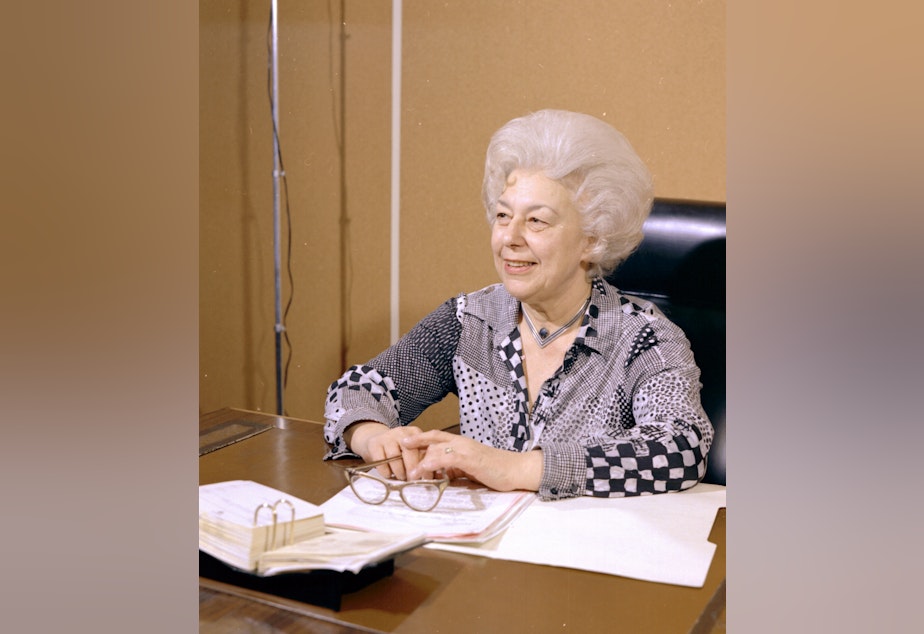50th anniversary of landmark LGBTQ rights law in Seattle

In 1973, Seattle City Councilmember Jeanette Williams made history. She sponsored an ordinance that made it illegal to discriminate against gay people in the workplace.
Williams passed away in 2008. One of her former staffers, Tom Rasmussen, who eventually served on the City Council himself, explained Williams' legacy as an ally of Seattle's LGBTQ community in a time before gay rights.
“One of the great fears for a young man or young woman coming out is the inability to get a job, being fired from a job," said Rasmussen, who is gay. "At least there was a safe community, such as Seattle, where you were less likely to be fired because you're gay."
But Williams was no political radical. She was an establishment figure in Democratic Party politics. Rasmussen remembered her cinematically fashionable style and attitude.
“Jeanette was relatively small. She was about 5 '4"or 5' 3", but she wore a really big beehive. Her hair was really tall, and high,” he said. “I remember walking into her office one time — she smoked in her office — she was spraying her hair with his hairspray, with a cigarette in her mouth. I thought, God Almighty, she's going to blow the whole place up.”
RELATED: Remembering Seattle's gay country music pioneer
According to Rasmussen, Williams stood up for gay rights throughout much of her career. That support came in part due to prodding by gay rights activists, who had been organizing since the late 1960s.
Sponsored
Rasmussen said Williams' willingness to support gay rights also reflected her core political values and a belief in civil rights.
“I heard her say that she was elected to represent everyone," he said. "She felt really strongly about the importance of women's rights, of LGBTQ rights, and worked for them."
Her public support started in the early '70s, after some activists persuaded her to do something politically edgy — invite gay rights advocates to testify in a series of City Council hearings.
At that time, sodomy was still a crime in Washington state. Activists wanted Seattle police to stop targeting gay people for vice crimes and entrapping them in sting operations.
Some of that audio testimony is preserved in the city archives.
Sponsored
“Seattle citizens are far more than incidentally engaged in homosexual practices and behavior. Not all of these would admit to being gay if you ask them, but they are there,” said gay rights activist Tim Mayhew, addressing the council on behalf of a group called the Seattle Gay Alliance. “I think the group that I represent has numbers and weight that deserve consideration.”
In other words, support gay rights, or we’ll do our best to vote you out of office.
After those hearings, activists continued to meet with Councilmember Williams and persuaded her to take a historic next step to sponsor the ordinance against employment discrimination.
Williams had the courage to champion gay rights at a time when almost no other elected officials did, Rasmussen said. But she wasn’t everyone's idea of the perfect progressive hero.
As the King County Democratic Party leader, she had publicly supported the Lyndon Johnson administration against Vietnam War protests.
Sponsored
“She had to be really tough and take a lot of criticism. She took that character, that style, that strength, to her job at City Council,” he said.
According to Rasmussen, Jeannette Williams' story is still relevant today, in the face of attacks on LGBTQ+ rights across the country.
The historical lesson is for the LGBTQ+ community and its allies to “not be divided” and stay united against hate, Rasmussen said.
“People who want to discriminate, people who want to victimize other people for political reasons, don't stop with one small group,” he said.
For her part, Williams continued to push for gay rights in her role on the City Council. In 1975, with prodding from grassroots activists, she took it beyond employment to sponsor a ban on housing discrimination based on sexual orientation.
Sponsored
Since then, more protections against discrimination have been expanded and enshrined in city and now Washington state law.




